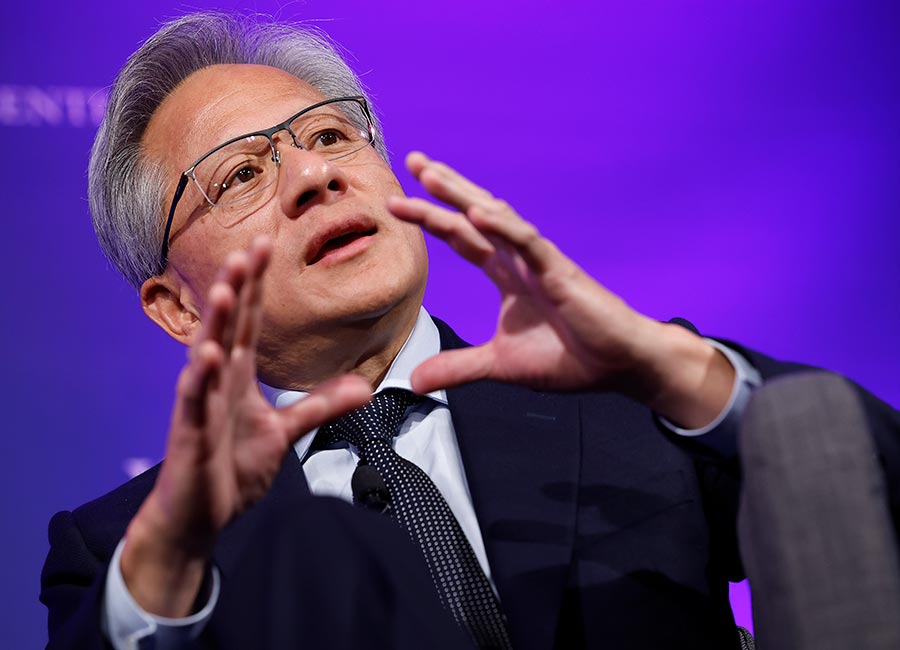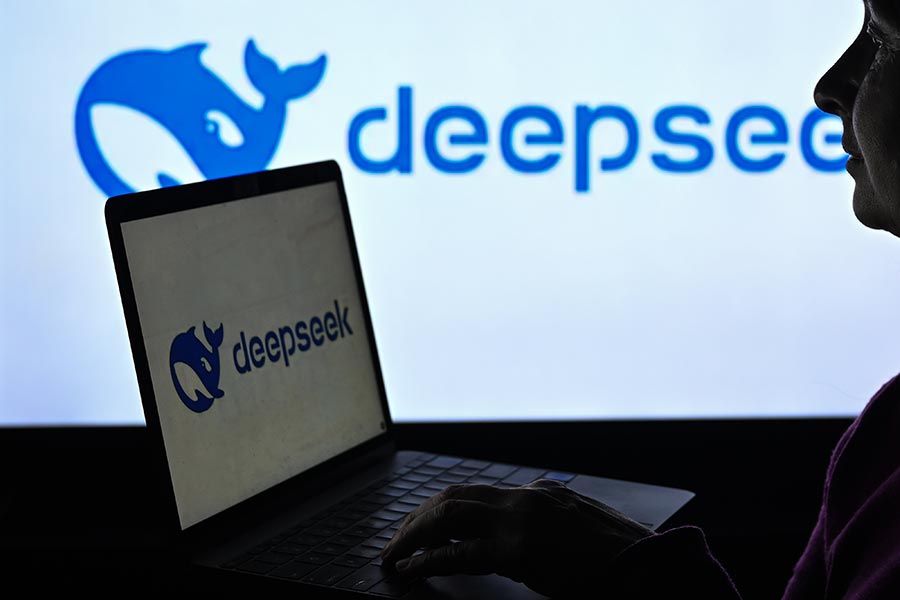As "black swan" events go, it takes some beating. Barely a week ago, few people had heard of a Chinese AI technology start-up called DeepSeek, writes Patrick Tooher.
Fewer still knew anything about its reclusive, low-profile founder Liang Wenfeng. All that changed yesterday.
Shares in US chip giant Nvidia crashed almost 18pc - wiping $589bn off its stock market valuation - on news that DeepSeek's artificial intelligence (AI) tool had become the most downloaded iPhone free app, overtaking Open AI's Chat GPT chatbot.
It was the biggest one-day destruction of value in stock market history and saw Nvidia - whose stock had soared on the back of booming demand for its most advanced semiconductors that power AI and underpin all digital computing - toppled from its perch as the world's biggest quoted company.
Other tech titans fell too as fears grew that the fortunes they have spent on cutting-edge AI models that recognise patterns and make decisions without human intervention may have been wasted.
The rout in technology stocks will certainly be painful for many Irish investors.
The so-called Magnificent Seven - Apple, Google-owner Alphabet, Amazon, Facebook-owner Meta, Microsoft, Tesla and Nvidia - have proved hugely popular investments on this side of the Atlantic in recent years.
And they have been highly lucrative, with Nvidia up almost ten-fold since the beginning of 2023 before yesterday's record sell-off.
Many savers who do not own these technology stocks outright are exposed through their pensions or other investments such as London-listed trusts.
For example, the Scottish Mortgage Investment Trust, a member of the FTSE100, counts Amazon, Meta and Nvidia among its top five holdings. The business's shares fell 5.2pc yesterday.
DeepSeek's breakthrough is building an AI training model using Nvidia's cheaper chips for under €5m, which is a fraction of the cost of what US firms are spending.
"Big tech firms like Microsoft, Google, Amazon and Meta have deployed hundreds of billions to purchase GPUs [graphic processing units, or microchips] from Nvidia and ensure chip supply to satisfy the insatiable demand for AI," said Javier Correonero, equity analyst at investment research company Morningstar.
"DeepSeek is challenging that hypothesis."
Financier Marc Andreessen went further. He described DeepSeek's latest model as "AI's Sputnik moment" - a reference to the Soviet Union's launch of the first artificial satellite in 1957 that kick-started the space race with the US.
High-flying Nvidia wasn't meant to fall to earth like this.
Experts always feared the chip designer's remarkable rise was most at risk from China.
They pointed to Beijing's long-held claim to Taiwan, the neighbouring island which makes more than 60pc of the world's microchips - silicon discs with billions of transistors carved into them.
Crucially, Taiwan also makes over 90pc of the most advanced chips used in satellites, stealth jets and, increasingly, AI.
The US government vowed to defend Taiwan with force in the event of an invasion - possibly within three years, it reckoned.
But it turned out Nvidia and other US tech giants were laid low without a shot being fired.
Instead, they were hit by a much more imminent threat that came completely left-field - from a billionaire hedge fund manager who started a tiny AI lab in eastern China as a hobby just a few years ago.
So just who is Liang Wenfeng? The son of a primary school teacher, Liang, 40, is an engineering graduate from Zhejiang University in Hangzhou who founded a successful hedge fund called High-Flyer and made a fortune betting on financial markets.
He gained a reputation for the innovative use of AI trading strategies which use computer algorithms to predict market trends and make datadriven investment decisions.
In 2021, he started buying thousands of Nvidia's GPUs for what was at the time an AI sideliner to his day job as hedge fund manager.
"When we first met him, he was this very nerdy guy with a terrible hairstyle talking about building a 10,000-chip cluster to train his own models," one of Liang's business partners told the Financial Times.
"We didn't take him seriously," the individual added.
"He couldn't articulate his vision other than saying: 'I want to build this, and it will be a game changer'."
In 2023, Liang launched DeepSeek, with a plan to develop human-level AI by focusing on research and engineering, rather than commercial return - the company is not listed on any stock market so you can't invest in it.
In a rare interview, Liang said he was fascinated by the potential of artificial general intelligence - a type of AI that gives a machine the power to understand or learn any intellectual task that a real person can by mimicking the cognitive abilities of the human brain.
"The essence of human intelligence might be language," he said.
Another motive of Liang's is to challenge US hegemony in AI. Companies such as Nivida have led the way in AI chip design, while OpenAI and Google's DeepMind have pioneered developments in reasoning models that try to make machines match - or even surpass - human cognitive capabilities.
"Nvidia's leadership isn't just the result of one company's efforts," Liang said.
"It's the collective achievement of the entire Western tech community and industry. They can see the next generation of technological trends and have a roadmap."
Liang believes that China must build its own AI ecosystem in response.
So when Washington recently banned Nvidia from exporting its most powerful chips to China, DeepSeek was ready to pounce.
The company had already worked out how to find innovative ways to maximise the computing power of the Nvidia chips China already had - even though they were not state-of-the-art.

Last week, the business explained in detail how to build a large language model on a shoestring that can automatically learn and improve itself without human supervision.
It was the news that sent shockwaves across the tech world - and led to one of the biggest sell-offs in stock market history.
It also made Liang a national hero at home.
He was the only AI leader picked to attend a meeting of entrepreneurs with Li Qiang, the second-ranking member on the Politburo Standing Committee of the Chinese Communist Party - second-only to President Xi Jinping.
They were told to 'concentrate efforts to break through key core technologies'. Liang has certainly done that.











